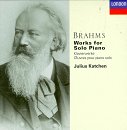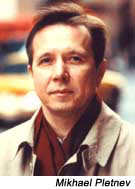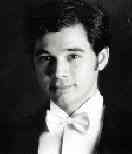 pianist, with several acclaimed recordings under his belt. At his debut recital at Blackheath, he also seemed not quite to have the measure of the same piano, and the intimacy of the Recital Room.
pianist, with several acclaimed recordings under his belt. At his debut recital at Blackheath, he also seemed not quite to have the measure of the same piano, and the intimacy of the Recital Room. Pianists 3 X 4 (Andrews, Boyde & Pletnev)
Marcus Andrews at Blackheath Halls 5 November; Andreas Boyde at Blackheath Halls 16 November; Mikhail Pletnev at Royal Festival Hall 16 & 20 November
Three pianists at different stages of their careers launched concert series of four appearances each.
Marcus Andrews has a Young Artists' Series residency at Blackheath Halls, following Helen Reid last year. He was well supported by an enthusiastic audience, and the Recital Room in "cabaret" guise (tables, candles and drinks encouraged) is a good venue to spend a relaxing evening.
But perhaps he had been a little too relaxed in preparing this recital; his CV shows that he is a very busy, versatile musician, teaching, accompanying etc whilst building his career as a solo pianist.
Best were Schoenberg's tiny pieces Op 19 and Five Bagatelles by the Australian Carl Vine. New recitalists are wise to feature unfamiliar music to stretch their audiences. Less wise was Marcus Andrews to brook comparisons with the war-horses which comprised the main part of his programme. He seemed unsettled beginning with Beethoven's Pathetique sonata, and it was probably not a good idea to bring us all ten of Rachmaninov's Op 23 Preludes, substantial works and far from preludial in character.
Andrews has well trained, strong fingers and is clearly a generally well-equipped musician, but on this first showing he needs to give more thought to niceties of timbre and dynamics; one felt that sometimes his muscles remembered well learnt movements, but that his ears were not in full control of the Blackheath Bosendorfer.
Andreas Boyde is a well established young recitalist and concerto  pianist, with several acclaimed recordings under his belt. At his debut recital at Blackheath, he also seemed not quite to have the measure of the same piano, and the intimacy of the Recital Room.
pianist, with several acclaimed recordings under his belt. At his debut recital at Blackheath, he also seemed not quite to have the measure of the same piano, and the intimacy of the Recital Room.
This recital was given on the 'first leg' of a project to tour America and Europe with the complete original works for piano solo by Brahms, and to record them. That is a heroic undertaking, one that few have ventured since the memorable recital series of Julius Katchen, and his bench-mark boxed set of 6 CDs, originally issued on LPs (London 4552472).
Andreas Boyde began well with a convincing account of the rarely heard Scherzo Op 4, a big work which no more fits the 'joke' connotation of its title than do those of Chopin. His command of the relentless passage work was complete, and his spare pedalling and variety of nuances boded well. The long first half continued with the Op 9 Schumann Variations, and here he could with advantage have paid far more attentive respect to the numerous pp and ppp markings to rest our ears; that Boyde has all grades of dynamics and tone qualities in his equipment was amply demonstrated in his Schumann recital at Wigmore Hall, and on his several Athene CDs. I found the Op 116 Fantasies less persuasive as a whole, and was not sure whether his interpretations had reached their definitive form.
The huge Sonata Op 1 brought the strenuous recital (for player and audience) to a satisfying close with a no-holds barred assault in accord with the young Brahms going all out for the world's attention and recognition. The Minneliede movement based on an old song was beautifully handled and gave welcome respite before another barnstorming Scherzo (allegro molto e con fuoco) and the tempestuous finale, with liberal crescendo markings which had me thinking of a jockey whipping his steed to the finish.
It will be interesting to see how Boyde's Brahms is developing when he returns with further recitals next year; there is the makings of a fine cycle - a great one, we will see? Perhaps Andreas Boyde should consider the possibility of trying the Fazioli in the Great Hall, as Helen Reid did so successfully last year. With the seating arranged in a semi-circle it is possible to create a feeling of intimacy, encouraging for performers, even when the audience is a small one.
 The same evening, Mikail Pletnev, one of my top-favourite pianists, began his 4 concert Rachmaninov series at Royal Festival Hall, following his memorable Tchaikovsky cycle in 2000. Beginning with the first of the piano concertos, composed when a student and revised in 1917, Pletnev's well remembered conscious relaxation, on approaching the keyboard and during orchestral tuttis, belies the power that he can unleash apparently without effort.
The same evening, Mikail Pletnev, one of my top-favourite pianists, began his 4 concert Rachmaninov series at Royal Festival Hall, following his memorable Tchaikovsky cycle in 2000. Beginning with the first of the piano concertos, composed when a student and revised in 1917, Pletnev's well remembered conscious relaxation, on approaching the keyboard and during orchestral tuttis, belies the power that he can unleash apparently without effort.
Once again, Pletnev practically persuaded one that he was 'composing' the music as he played it, and there was an easy rapprochment with the young conductor Tugan Sokhiev, who went on to give an exceptionally rich and sonorous account of the 2nd Rachmaninov symphony, with saturated string sound and the whole huge orchestra at one in rubato as if it were chamber music; their sound took me back to memories of Karajan's Brahms symphony cycle there, probably with the same orchestr a.
a.
These good impressions were reinforced at their second concert together. Sokhiev made as good a case as possible for the Tchaikovsky Russian Easter Festival overture (skilful orchestration, but a few familiar tunes worked to death; a piano transcription would reveal how little 'music' there really is in it). Excerpts from Prokofiev's Romeo & Juliet ballet music showed Sokiev's predeliction for balance and blend; beautifully played but with less bite than some other conductors bring to it.
Pletnev and Sokhiev brought a feeling of sympathy with the music and rapport with each other to an unforgettable performance of the astonishingly comprehensive and all embracing 3rd Rachmaninov concerto, once again creating an illusion that it was verily being created as we listened, and leaving no doubt that it is one of the greatest piano concertos of all time.
Hear Pletnev play Rachm Nos. 2 & 4 with Gergiev & the Philharmonia at RFH next week.
© peter grahame woolf 2003